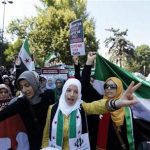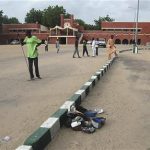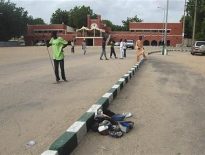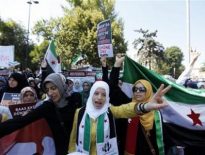By Pascal Fletcher and Aaron Maasho
ADDIS ABABA (Reuters) – Africa faces a serious threat from al Qaeda and its allies trying to set up a sanctuary in northern Mali, African leaders said on Saturday as they pondered political and military strategies aimed at reuniting the divided West African state.
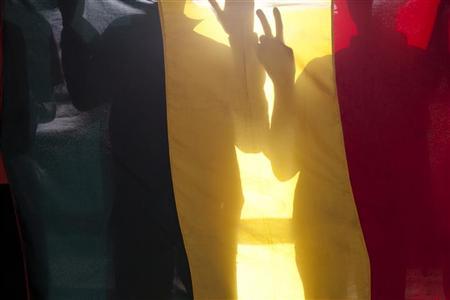
The leaders meeting at the African Union (AU) in Addis Ababa are seeking to resolve messy aftermaths of military coups this year in Mali and Guinea-Bissau which have put blots on the continent’s democratic credentials after advances in stability and governance in recent years.
They are also seeking to reconcile feuding neighbours Sudan and South Sudan after the latter’s independence last year split what used to be Sub-Saharan Africa’s largest country.
But one factor distracting the African heads of state from the continent’s serious security and development challenges is a bruising contest over who should head the AU Commission, which steers the regional diplomatic body.
The standoff, which has broadly split Africa’s French- and English-speaking blocs into two camps, pits South African Home Affairs Minister Nkosazana Dlamini-Zuma against incumbent Jean Ping from Gabon and risks dominating the weekend summit in Addis Ababa.
At a meeting of the AU’s Peace and Security Council on Saturday, the presidents worked to flesh out a plan to deal with Mali, where al Qaeda-linked local and foreign jihadists have seized control of the largely desert north after hijacking a rebellion by secular Tuareg separatists earlier this year.
Ivory Coast President Alassane Ouattara, chairing the security council, condemned what he called “the intention of terrorist groups to create a sanctuary in northern Mali”.
Denouncing alleged links between al Qaeda in the Sahel region and other violent radical Islamist groups, such as Boko Haram in Nigeria and al Shabaab in Somalia, Ouattara said this posed “a serious threat to regional security”.
African leaders are seeking U.N. Security Council support for military intervention in Mali to end the rebellion in the north and reunite the Sahel state, which was split after a March 22 military coup in the capital Bamako.
The Security Council has endorsed West African efforts to end the unrest in Mali but has stopped short of backing a military operation until African leaders can clearly spell out its objectives and how it would be carried out.
“For the moment, nothing is ready,” one European diplomat, who follows the region closely, said.
Urging the AU to urgently develop a clear strategy for Mali, AU commission chief Ping called it “one of the most serious crises to confront the continent”.
The AU’s peace and security commissioner Ramtane Lamamra said on Friday the African body was giving priority to finding a peaceful political solution in Mali but was preparing for a military intervention “as a last resort”.
Negotiating efforts have focused on fully handing back power in the southern half of Mali to a civilian government, although Ouattara said these moves were still being “disturbed” by the same military elements who carried out the March 22 coup.
Ouattara repeated the AU position that there would be no negotiations with “terrorist groups” in northern Mali, although some dialogue has been held with secular Tuareg separatists and leaders of the local Islamist Ansar Dine insurgent group.
DEADLOCK OVER AU LEADERSHIP
The AU’s current chairman, Benin President Yayi Boni, urged the continent’s leaders to resolve the security and governance problems in Mali and Guinea-Bissau, saying they acted as a distraction from the more strategic task of delivering economic growth and development to Africa’s people.
“Without peace, there can be no development,” Boni said.
But even as the African leaders considered the region’s problems, their work was overshadowed by the AU Commission leadership race. This has remained deadlocked since a January summit vote ended in stalemate between the candidacies of Gabon’s Ping and South Africa’s Dlamini-Zuma.
With Ping carrying the broad support of Africa’s French-speaking states, and English-speaking states in southern Africa lining up behind Pretoria’s candidate, the continental body risks a division that could affect its global credibility and crisis-handling capacity if it persists, diplomats said.
As the debate over the leadership contest swirled in the corridors of the AU’s soaring Chinese-built steel and glass headquarters, rumours of compromise candidates to break the deadlock appeared as thick, fast and numerous as the boxy blue Soviet Lada taxis that crowd Addis Ababa’s streets.
“It’s hard to get to the truth of this,” lamented Uganda’s state minister for foreign affairs, Henry Okello. He was confident that the AU meeting could finally choose a new commission head, but he stressed “it should be a person that does not polarise”.
There were hopes too that Sudan’s President Omar Hassan al-Bashir, and Salva Kiir, the president of South Sudan, could meet at the summit to revive faltering talks. The neighbours came close to war in April after they clashed over undefined borders and the sharing out of oil revenues.


